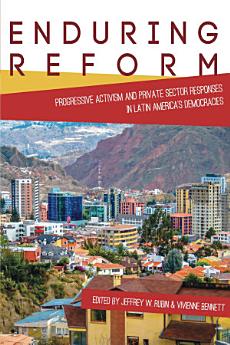Enduring Reform: Progressive Activism and Private Sector Responses in Latin America's Democracies
Jeffrey W. Rubin · Vivienne Bennett
Feb 2020 · Pitt Latin American Series Book 349 · University of Pittsburgh Press
Ebook
272
Pages
reportRatings and reviews aren’t verified Learn More
About this ebook
Over the last twenty years, business responses to progressive reform in Latin America have shifted dramatically. Until the 1990s, progressive movements in Latin America suffered violent repression sanctioned by the private sector and other socio-political elites. The powerful case studies in this volume show how business responses to reform have become more open-ended as Latin America's democracies have deepened, with repression tempered by the economic uncertainties of globalization, the political and legal constraints of democracy, and shifting cultural understandings of poverty and race.
Enduring Reform presents five case studies from Mexico, Brazil, and Argentina in which marginalized groups have successfully forged new cultural and economic spaces and won greater autonomy and political voice. Bringing together NGO's, local institutions, social movements, and governments, these initiatives have developed new mechanisms to work 'within the system,' while also challenging the system's logic and constraints.
Through firsthand interviews, the contributors capture local businesspeople's understandings of these progressive initiatives and record how they grapple with changes they may not always welcome, but must endure. Among their criteria, the contributors evaluate the degree to which businesspeople recognize and engage with reform movements and how they frame electoral counterproposals to reformist demands. The results show an uneven response to reform, dependent on cultural as much or more than economic factors, as businesses move to decipher, modify, collaborate with, outmaneuver, or limit progressive innovations.
From the rise of worker-owned factories in Buenos Aires, to the collective marketing initiatives of impoverished Mayans in San Crist—bal de las Casas, the success of democracy in Latin America depends on powerful and cooperative social actions and actors, including the private sector. As the cases in Enduring Reform show, the democratic context of Latin America today presses businesspeople to endure, accept, and at times promote progressive change in unprecedented ways, even as they act to limit and constrain it.
Enduring Reform presents five case studies from Mexico, Brazil, and Argentina in which marginalized groups have successfully forged new cultural and economic spaces and won greater autonomy and political voice. Bringing together NGO's, local institutions, social movements, and governments, these initiatives have developed new mechanisms to work 'within the system,' while also challenging the system's logic and constraints.
Through firsthand interviews, the contributors capture local businesspeople's understandings of these progressive initiatives and record how they grapple with changes they may not always welcome, but must endure. Among their criteria, the contributors evaluate the degree to which businesspeople recognize and engage with reform movements and how they frame electoral counterproposals to reformist demands. The results show an uneven response to reform, dependent on cultural as much or more than economic factors, as businesses move to decipher, modify, collaborate with, outmaneuver, or limit progressive innovations.
From the rise of worker-owned factories in Buenos Aires, to the collective marketing initiatives of impoverished Mayans in San Crist—bal de las Casas, the success of democracy in Latin America depends on powerful and cooperative social actions and actors, including the private sector. As the cases in Enduring Reform show, the democratic context of Latin America today presses businesspeople to endure, accept, and at times promote progressive change in unprecedented ways, even as they act to limit and constrain it.
About the author
Jeffrey W. Rubin is associate professor of history at Boston University. He is the author of Decentering the Regime: Ethnicity, Radicalism, and Democracy in Juchitan, Mexico, coauthor of Sustaining Activism: A Brazilian Women's Movement and A Father-Daughter Collaboration, and coeditor of Lived Religion and Lived Citizenship in Latin America's Zones of Crisis, a special issue of the Latin American Research Review.
Rate this ebook
Tell us what you think.
Reading information
Smartphones and tablets
Install the Google Play Books app for Android and iPad/iPhone. It syncs automatically with your account and allows you to read online or offline wherever you are.
Laptops and computers
You can listen to audiobooks purchased on Google Play using your computer's web browser.
eReaders and other devices
To read on e-ink devices like Kobo eReaders, you'll need to download a file and transfer it to your device. Follow the detailed Help Center instructions to transfer the files to supported eReaders.







